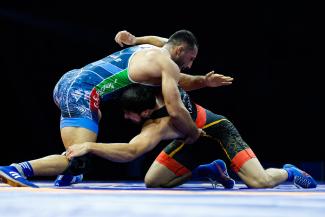Russia and India Lead Dan Kolov After Day Two
Friday, March 1, 2019 - 20:11 By Eric Olanowski

RUSE, Bulgaria (March 1) – lias BEKBULATOV and Magomed KURBANOV won the 70kg and 92kg Dan Kolov gold medals respectively and gave the Russian Federation (80 points) a 15 point lead over the United States (65 points) heading into the third day of competition at the Monbat Sports Park Arena in Ruse, Bulgaria.
In the all-Russian 70kg finals, lias Bekbulatov closed out his dominating Dan Kolov performance with a 10-0 win over Anzor ZAKUEV (RUS). In total, Bekbulatov only surrendered two points in his four matches and outscored his opponents 38-2.
Bekbulatov, arguably the best wrestler in the world to never compete at a world championship, scored an inactivity point, followed by a takedown and controlled the 3-0 lead heading into the second period. The 2018 European runner-up stalked Zakuev in the second period and scored seven straight points to close out the match with a 10-0 shutout victory.
It’s also worth noting, Russia’s Viktor RASSADIN defeated 2016 Rio Olympic fifth-place finisher Frank Aniello MOLINARO (USA), 15-10 in the 70kg bronze-medal bout, giving Russia their third 70kg medal. Russia entered three wrestlers into the 70kg bracket and finished first, second, and third receptivity.
The second Russian gold-medal winner on the day was Magomed KURBANOV (RUS).
Kurbanov trailed 3-1 after the opening period of the 92kg finals, but ignited in the second and outscored Irakli MTSITURI (GEO) 8-2 in the final frame to pick up the 9-5 victory.
Meanwhile, the United States, who sits in second place with 65 points, welcomed a champion in Alexander DIERINGER. Dieringer, who also goes by “Ringer,” quickly dismantled Omaraskhab NAZHMUDINOV (ROU), 10-0 in the opening period of the 79kg finals. In the last twelve months, Dieringer, who is the No. 2 79kg American guy behind reigning world champion Kyle DAKE, has won titles at the Alexander Medved Prizes, International Ukrainian Tournament, and the Dan Kolov, while also finishing in third-place at the first Ranking Series event of the season, the Ivan Yariguin.
The final freestyle gold of the day went to Kazakhstan’s Nurislam SANAYEV. It took just 35 seconds for Sanayev to wrap up Sandeep TOMAR (IND) in the 61kg finals. The reigning 57kg world silver medalist scored an early takedown from a duck under and seamlessly transitioned into four leg laces, ending the match with a 10-0 technical superiority victory.
In women’s wrestling, Pooja DHANDA’s 59kg gold and Sakshi MALIK ‘s 65kg silver gave India (45 points) the ten point lead over Turkey (35 points) after the second day of wrestling in Ruse.
Dhanda, the 2018 world bronze medalist at 57kg, bumped up to 59kg and went undefeated in the round-robin competition to claim the gold medal. Her teammate Malik, the Rio bronze medalist who upset reigning world champion Petra OLLI to make the 65kg finals, fell to Sweden’s Henna JOHANSSON (SWE), 8-3 in the gold-medal match. Johansson reached the top of the Klippan Lady Open podium last weekend and won her second consecutive tournament when she stopped Malik’s quest for gold today.
Turkey sits in second place, thanks to fourth-ranked Buse TOSUN’s gold-medal performance at 72kg. In the finals, Tosun broke a 4-4 tie, scoring the match-deciding takedown with 15 seconds left, defeating Alina BEREZHNA STADNIK MAKHYNIA (UKR), 6-4.
The final women’s wrestling gold medal of the day went to Greece’s Maria PREVOLARAKI (GRE). The 2018 European bronze medalist controlled the entirety of 55kg gold-medal match with her left side underhook, completely shutting down Kazakhstan’s Marina SEDNEVA, 10-0 to win her first Ranking Series title.
Wrestling resumes tomorrow in Ruse at 10:00 (local time), with the Day Three finals beginning at 18:00.
For news, highlights, interviews, and behind the scenes clips, make sure you’re following United World Wrestling on Facebook, Instagram, and Twitter.
RESULTS
Freestyle
Team Scores
GOLD - Russia (80 points)
SILVER - United States (65 points)
BRONZE - Georgia (39 points)
Fourth - Turkey (35 points)
Fifth - Ukraine (33 points)
61kg
GOLD - Nurislam SANAYEV (KAZ) df. Sandeep TOMAR (IND), 10-0
BRONZE - Aryian TIUTRIN (RUS) df. Joseph Daniel COLON (USA), 13-3
BRONZE - Volodymyr BURUKOV (UKR) df. Munir Recep AKTAS (TUR), 3-2
70kg
GOLD - Ilias BEKBULATOV (RUS) df. Anzor ZAKUEV (RUS), 10-0
BRONZE - James GREEN (USA) df. Andriy KVYATKOVSKYY (UKR), via inj. def.
BRONZE - Viktor RASSADIN (RUS) df. Frank MOLINARO (USA), 15-10
79kg
GOLD - Alexander DIERINGER (USA) df. Omaraskhab NAZHMUDINOV (ROU), 10-0
BRONZE - Atsamaz SANAKOEV (RUS) df. Ender COSKUN (TUR), 4-3
BRONZE - Nika KENTCHADZE (GEO) df. Muhammet KOTANOGLU (TUR), 5-0
92kg
GOLD - Magomed KURBANOV (RUS) df. Irakli MTSITURI (GEO), 9-5
BRONZE – Ibrahim BOLUKBASI (TUR) df. Suleyman KARADENIZ (TUR), 7-6
BRONZE - Michael Justin MACCHIAVELLO (USA) df. Mohammed FARDJ (ALG), via inj. def.
Women's Wrestling
Team Scores
GOLD - India (45 points)
SILVER - Turkey (35 points)
BRONZE - Sweden (33 points)
Fourth - Ukraine (28 points)
Fifth - Greece (25 points)
55kg
GOLD - Maria PREVOLARAKI (GRE) df. Marina SEDNEVA (KAZ), 10-0
BRONZE - Roksana Marta ZASINA (POL) df. Bediha GUN (TUR), 4 - 0
BRONZE - Zhuldyz ESHIMOVA (KAZ) df. Zalina SIDAKOVA (BLR), 4-25
59kg (Round-Robin)
GOLD - Pooja DHANDA (IND)
SILVER - Sarita SARITA (IND)
BRONZE - Kornelija ZAICEVAITE (LTU)
BRONZE - Aisuluu TYNYBEKOVA (KGZ)
65kg
GOLD -Henna JOHANSSON (SWE) df. Sakshi MALIK (IND), 8-3
BRONZE - Petra OLLI (FIN) df. Adina POPESCU (ROU), via inj. def.
BRONZEForrest MOLINARI (USA) df. Maya NELSON (USA), 6-3
72kg
GOLD - Buse TOSUN (TUR) df. Alina BEREZHNA STADNIK MAKHYNIA (UKR), 6-4
BRONZE - Maria SELMAIER (GER) df. Zhamila BAKBERGENOVA (KAZ), via DSQ
BRONZE - YAN Chuchu (CHN) df. Meerim ZHUMANAZAROVA (KGZ), via forfeit


Share your thoughts.
Comments